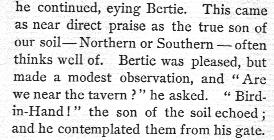Philosophy 4 by Owen Wister
I love this charming, nostalgic story of college days in Cambridge, Massachusetts in the 1880's. I think it will captivate anyone familiar with the Boston area.
Owen Wister is best known for his novel, "The Virginian," which helped codify the legend of the cowboys of the American West (and which is the source of the line "When you call me that, smile."
As far as I can tell, "Philosophy 4" is out of copyright and out of print. (Anybody interested in reprinting it is urged to contact me.)
Introduction
Copyright © 1997 by Daniel P. B. Smith. All rights reserved.
I first ran across "Philosophy 4" in the MIT library when I was an
undergraduate. I found it enchanting at the time. I still do now. I
found a copy in a second-hand bookstore, which became a prized possession
which I now share with you. It is an unforgettable picture of a bygone
day which I think will resonate with others who, like me, went to college
in the Boston area. It is full of little details that create a
sense of time and place. Imagine the tower of Memorial Hall being
visible from Jamaica Plain; imagine a trip from Cambridge to Braintree
in which the most noticeable sound was that of church clocks striking. I
am haunted by a character saying "reverently" that "the rum there is old
Jamaica brought in slave-ships." I cherish such passages as:
"they reached Harvard Square. Not your Harvard Square, gentle reader,
that place populous with careless youths and careful maidens and
reticent persons with books, but one of sleeping windows and clear, cool
air and few sounds ; a Harvard Square of emptiness and conspicuous
sparrows and milk wagons and early street-car conductors in long coats
going to their breakfast; and over all this the sweetness of the arching
elms."
Notes on the text:
My purpose is to reproduce the flavor of the original as closely as
follow. Accordingly, I have included the complete text of all the front
matter and the publisher's advertisements appearing in the back. To the
best of my proofreading ability, I have reproduced spelling,
capitalization, hyphenation, punctuation and word usage exactly as they
appear in the original. Some examples:
-- the spelling of the word "favourite"
-- the uncapitalized "its weight" in the passage "According to Plato,
Locke, Berkeley, where would the sweetness of a honeycomb reside?
Where would its shape? its weight?"
-- The question mark outside the quotation marks in the passage:
Did not Billy remember singing "Brace up and dress the
Countess," and "A noble lord the Earl of Leicester"?
-- The phrase "I waked John up"
The text spacing conventions of the original are quite different from
what I am used to. I haven't tried to reproduce them because they are
difficult to proofread accurately and look irritating to me when
rendered in monospaced type. For example, one passage in the book
would be transcribed as follows. There is almost an en-space before
and after question marks, exclamation points, quotation marks, and even
semicolons:

he continued, eying Bertie. This came
as near direct praise as the true son of
our soil -- Northern or Southern -- often
thinks well of. Bertie was pleased, but
made a modest observation, and " Are
we near the tavern ? " he asked. " Bird-
in-Hand ! " the son of the soil echoed ;
and he contemplated them from his gate.
Because I do not want to depart from plain ASCII, I have also omitted a
dieresis which the original places on the second e of the word
"reentered."
What do you think?
- Are we intended to understand that Oscar Maironi is Jewish? Is Wister expressing a mild antisemitism? Does he take it for granted that the reader shares it?
- Is there a trace of homophilia in the narrator's own attitude toward his subjects? (I sometimes think I notice this in "The Virginian" as well).
- To the modern ear, the phrase "Bertie and Billy did not put one in mind of virgins" seems like a sly reference to sexual experience. Is this what Wister intends?
- Do you understand the point of the joke about Oscar keeping his notes in the bath? I don't. What do you think he mean by the word "racial" when he categorizes Oscar's remark about the notes burning as "a racial suggestion?" And what makes Billy say later, "I don't believe Oscar owns a bath?"
- Can you remember any other novel set in the North which depicts a character telling war stories about the Civil War? You'd think this would be common, yet I must have read hundreds of stories and novels set in the United States around the turn of the century without encountering this anywhere else. (Think of Stephen Crane's stories set in turn-of-the-century New York, for example.)
- Have there been changes in the style of writing examination questions? The exam he reproduces seems to be phrased very differently from the exams I took in college.
- At the end, Wister says that Billy is "superintendent of passenger traffic of the New York and Chicago Air Line." Wister is writing in 1901, and Billy went to Harvard in "the eighties." What do you suppose he meant by an 'Air Line?"
- Who was Epicharmos of Kos?
--Daniel P. B. Smith
dpbsmith@world.std.com
Forward (Part I)
Contents
Date created: 3/6/97
Last modified: 3/7/97
Introduction Copyright © 1997, Daniel P. B. Smith; All Rights Reserved
center>
Comments to: Dan Smith
Dan Smith's home page

